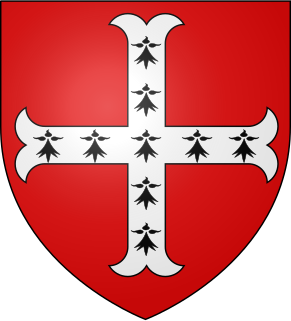Robert Burnell was an English bishop who served as Lord Chancellor of England from 1274 to 1292. A native of Shropshire, he served as a minor royal official before entering into the service of Prince Edward, the future King Edward I of England. When Edward went on the Eighth Crusade in 1270, Burnell stayed in England to secure the prince's interests. He served as regent after the death of King Henry III of England while Edward was still on crusade. He was twice elected Archbishop of Canterbury, but his personal life—which included a long-term mistress who was rumoured to have borne him four sons—prevented his confirmation by the papacy. In 1275 Burnell was elected Bishop of Bath and Wells, after Edward had appointed him Lord Chancellor in 1274.
Robert Winchelsey was an English Catholic theologian and Archbishop of Canterbury. He studied at the universities of Paris and Oxford, and later taught at both. Influenced by Thomas Aquinas, he was a scholastic theologian.
Silvester de Everdon was a medieval Bishop of Carlisle and Lord Chancellor of England.
John de Halton, also called John de Halghton, was an English priest and Bishop of Carlisle from 1292 to 1324.

William of Kilkenny was a Lord Chancellor of England and Bishop of Ely.
John Langton was a chancellor of England and Bishop of Chichester.

Antony Bek was a bishop of Durham and the Patriarch of Jerusalem.
Philip of Poitou was Bishop of Durham from 1197 to 1208, and prior to this Archdeacon of Canterbury.
John Kirkby was an English ecclesiastic and statesman.
Geoffrey de Burgh was a medieval English cleric who was Archdeacon of Norwich (1200–1225), Bishop of Ely and the brother of William de Burgh and Hubert de Burgh, 1st Earl of Kent.
William of St. Barbara or William of Ste Barbe was a medieval Bishop of Durham.
William Chillenden, also known as Adam of Chillenden, was a monk at Christ Church Priory, Canterbury, and treasurer of that priory when he was elected Prior of Christ Church in 1263.
William Langton was a medieval English priest and nephew of Archbishop Walter de Gray. William was selected but never consecrated as Archbishop of York and Bishop of Carlisle.
Robert de Chauncy was a medieval Bishop of Carlisle.
Ralph Walpole was a medieval Bishop of Norwich and Bishop of Ely.
John Salmon was a medieval Bishop of Norwich.
William Cumin was a bishop of Durham, and Justiciar of Scotland.
William Scot was a medieval Bishop of Durham-elect.

Richard Marsh, also called Richard de Marisco, served as Lord Chancellor of England and Bishop of Durham.
Richard Middleton was an English ecclesiastic and Lord Chancellor of England.




